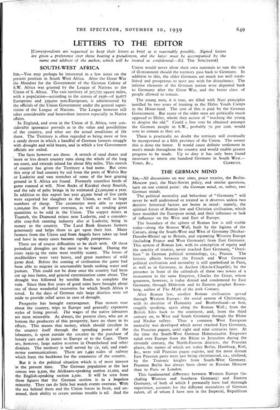LETTERS TO THE EDITOR
[Correspondents are requested to keep their letters as brief as is reasonably possible. Signed letters are given a preference over those bearing a pseudonym, and the latter must be accompanied by the name and address of the author, which will be treated as confidential.—Ed. THE SPECTATOR] SOUTH-WEST AFRICA Sm,—You may perhaps be interested in a few notes on the present position in South West Africa. After the Great War the Mandate for the Government of the German Colony of S.W. Africa was granted by the League of Nations to the Union of S. Africa. The vast territory of 317,725 square miles, with a population—according to the census of 1936—of 30,677 Europeans and 329,000 non-Europeans, is administered by the officials of the Union Government under the general super- vision of the League of Nations. The League however still takes considerable and benevolent interest especially in Native affairs.
In England, and even in the Union of S. Africa, very con- siderable ignorance prevails as to the value and possibilities of the country, and what are the actual conditions of life there. The Territory is often regarded as being more or less a sandy desert in which a handful of German farmers struggle with drought and wild beasts, and in which a few Government officials are exiled.
The facts however are these. A stretch of sand dunes and more or less desert country runs along the whole of the long sea coast, and extends inland for about fifty miles. This stretch of country has given the Territory a bad name. But cross this strip of bad country by rail from the ports of Walvis Bay or Luderitz and vast stretches of some of the best grazing ground in S. Africa are found. Formerly countless herds of game roamed at will. Now flocks of Karakul sheep flourish, and the sale of pelts brings in its estimated £1,000,000 a year. In addition to this export last year 43,000 head of live cattle were exported for slaughter to the Union, as well as large numbers of sheep. The creameries were able to export r,000,000 lbs. of butter overseas, as 'well as sending great quantities to be sold in the Union. The copper mines at Tsumeb, the Diamond mines near Luderitz, and a consider- able cray-fish canning industry also at Luderitz, bring in money to the country. The Land Bank finances farmers generously and helps them to get upon their feet. Many farmers from the Union and from Angola have taken up land and have in many cases become rapidly prosperous.
There are of course difficulties to be dealt with. Of these periodical droughts are the most to be feared. During the years 1930-34 the rains were terribly scanty. The losses of stockholders were very heavy, and great numbers of wild game died. Before the coming of civilisation the game had been able to migrate in uncountable herds seeking water and pasture. Thig could not be done once the country had been cut up into farms, and general extermination came about. The drought was followed by terrible floods to complete the ruin. Since then five years of good rains have brought about one of those wonderful recoveries for which South Africa is noted. In the days of German rule large districts were set aside to provide relief areas in case of drought.
Prosperity has brought extravagance. Fine motors tour about the country, trips to Europe and generally expensive styles of living prevail. The wages of the native labourers are most miserable. As always, the poorest class, who are at bottom the producers of this prosperity, have no share in its effects. This means that money, which should circulate in the country itself through the spending power of the labourers, is spent outside the country in the purchase of luxury cars and in jaunts to Europe or to the Cape. There are, however, large native reserves in Ovamboland and other districts. The territory is well served by air, rail, and road- motor communications. There are 1,490 miles of railway which form the backbone for the commerce of the country.
But it is the political situation which is of most interest at the present time. The German population at the last census was 9,500, the Afrikaans-speaking section 21,000, and the English-speaking section 2,500. It will be seen from these figures that the German section is in a hopeless minority. They can do little but watch events overseas. With the sea behind them and the Union forces in front, and un- armed, their ability to create serious trouble is nil. And the Union would never allow their own nationals to run the risk of-ill-treatment should the territory pass back to Germany. In addition to this, the older Germans are much too well estab- lished and prosperous to have any wish for disturbance. The inferior elements of the German nation were deported back to Germany after the Great War, and the better class of people allowed to remain.
The young men, it is true, are filled with Nazi principles instilled by two years of training in the Hitler Youth Camps in the Home-land. The cost of this is paid by the German Government. But many of the older men are politically much opposed- to Hitler, whom they accuse of "teaching the young to despise the old." Could a free vote be obtained amongst the German people in S.W., probably 7o per cent. would vote to remain as they are.
There is practically no doubt the territory will eventually be incorporated as a fifth province of the Union. The sooner this is done the better. It would cause definite settlement in men's minds throughout the country and would enable greater progress to be made. Up to date it has only been found necessary to intern one hundred Germans in South West.—




































 Previous page
Previous page